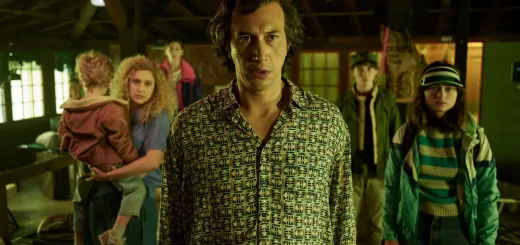Gringo: Ficcion Pulpa, by David Bax
Nash Edgerton’s Gringo would have been a mild sensation if it came out twenty years ago, the kind of movie whose posters would be all over dorm rooms and that would be in heavy rotation on the TV in your weed dealer’s apartment. That’s not a knock. It’s only to say that this kind of darkly comic crime thriller flourished in the post-Pulp Fiction, early Guy Ritchie days of the late 90s and early 2000s. Gringo‘s not quite as stylish as those movies of the genre’s heyday but it still delivers, and with a genuine interest in questions of morality to boot.
David Oyelowo heads up a large ensemble as Harold, a pencil pusher at a Chicago-based pharmaceutical company with a plant in Veracruz, Mexico. It’s on a business trip down there that things begin to go drastically wrong for Harold, with an alternating series of kidnappings and faked kidnappings unfolding against an increasingly deadly backdrop of DEA stings, drug cartel schemes and corporate intrigue. The cast also includes Joel Edgerton and Charlize Theron as Richard and Elaine, Harold’s bosses; Thandie Newton as his wife; Sharlto Copley as a special operative for hire; Harry Treadaway and Amanda Seyfried as naive American drug mules; Alan Ruck and Kenneth Choi as Richard and Elaine’s business rivals; Yul Vazquez as a chauffeur hiding more than one secret; and even a small turn from Bashir Salahuddin, who was a standout in Snatched, last year’s less successful Latin America kidnapping comedy.
Gringo‘s sense of humor also feels ported over from the 90s, in ways both good and bad. The drug kingpin (Carlos Corona) who tortures and kills people while asking them about their favorite Beatles albums feels a little too much like low-rent Tarantino. Other stuff sings, though, like the weird running joke in which people keep explaining themselves to Harold by using allegories about animals. Copley’s Mitch, though, is perhaps the most inventive creation of screenwriters Matthew Stone and Anthony Tambakis, a philanthropic mercenary who weighs the bad shit he does against the food, water and shelter he can provide to people in the developing world with the money he’s paid for it.
Mitch is only the most quirky, though, of the numerous characters Gringo employs to pose its questions about whether it pays to be a good person and what being a good person even means. This plot-heavy movie is surprisingly economical with exposition but deliberately excessive when it comes to illustrating how awful and selfish characters like Richard and Elaine are; openly discussing individual human lives in terms of profitability is just one of their repellent personality traits. Seyfried’s kind, appropriately named Sunny, on the other hand, is unequivocally one of the better angels. When Harold is at one of his many low points in the movie, recovering in a cheap hotel after a bloody shootout-cum-car crash of which he is the only survivor, he complains that the world is rigged against good people. Sunny replies, “The world is just fine. I think it’s some of the people who are wrong.” This is what counts for optimism in Gringo’s world; at least it makes the problem sound more manageable. Meanwhile, as should be expected, Mitch’s take on morality is more complex. He gets most of the way through a convincing argument that Judas, a man of principle who hung himself in remorse, is a worse person than the thrice-denying Peter before chaos erupts once again and Mitch is, let’s say, distracted.
As mentioned above, Gringo isn’t an especially stylish movie but neither is it an ugly one. Mostly, it effectively mimics the 21st century thriller look, angular and desaturated with the occasional pinpoints of high luminance light sources and reflections in the frame. But Edgerton’s experience as a stuntman and stunt coordinator shows in the stretches of action, which he shoots and cuts coherently and urgently. A moment in which Harold is attempting to scale a wall and Mitch knocks him down to the ground by throwing a duffel bag at him is presented in a wide frame that not only allows you to see and appreciate the whole stunt but also makes this violent physical exchange funny by keeping it at a distance. There’s a reason this shot is in every trailer. These touches, along with a pulsating score from the always reliable Christophe Beck, keep Gringo humming along nicely.
Gringo is likely too clearly indebted to its 90s predecessors to stand out from the pack but it’s funny (minus a lame fat joke near the end that I could’ve done without), the cast is great (especially Oyelowo, who keeps his hysterical fish out of water routine from running out of air by grounding it in painful humanity) and never suffers from a lack of action. Basically, if this kind of movie is your thing, Gringo fits the bill, lock, stock and dozens of smoking barrels.




























